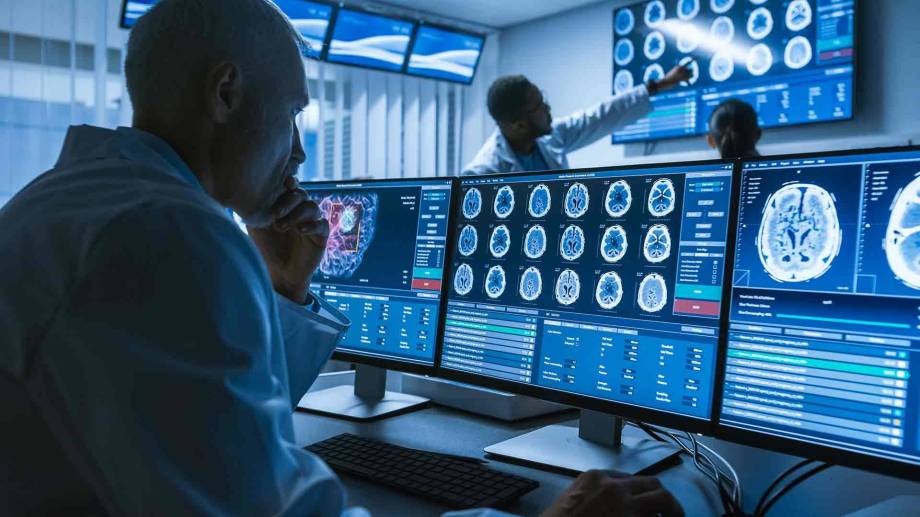
Basic Science
MUA has an integrated, systems-based curriculum that parallels the training you would receive at a top U.S. or Canadian medical school
MUA has an integrated, systems-based curriculum that parallels the training you would receive at a top U.S. medical school. This curriculum, in collaboration with our excellent faculty (all of whom have either an MD or a PhD in the field they teach), small class sizes and a focused emphasis on preparing you for Step 1 of the USMLE, will set you on the best course possible to becoming a doctor.

Key facts
- Location: Located on the beautiful island of Nevis, MUA’s 10-acre basic science campus boasts modern classrooms, fully equipped laboratories, an extensive library and a nearby island hospital offering students early clinical experience.
- The Curriculum: The curriculum is designed with your success in mind, emphasizing small class sizes and personalized instruction.
- Residency Achievement: 94% three-year residency placement rate.*
- Tuition for Students Entering on or after September 2024: Basic Science per semester tuition is $13,250 and Clinical Medicine is $15,250 per semester.
- Class Size: Our Basic Science students benefit from a 5:1 student-to-faculty ratio, allowing one-to-one instruction.
*94% Three-Year Residency Placement Rate is the percent of students attaining a residency position out of all graduates or expected graduates in 2022-2023, 2023-2024 and 2024-2025 who were active applicants in the NRMP match or attained a residency outside the NRMP match.
Sheldon Vogt, MD
Class of 2024
General Surgery
Loma Linda University Health
Loma Linda, California, United States
Vijitha Mahalingam, MD
Class of 2019
Psychiatry Resident
Queen’s University
Kingston, Ontario, Canada
Suraj Tandon, MD
Class of 2013
Internal Medicine & Palliative Medicine Specialist
University Health Network
Toronto, Ontario, Canada
Discover MUA: Curriculum and Culture
Josh Lowder shares how MUA’s hands-on learning and supportive environment helped shape his medical school experience.
Curriculum and Academic Calendar
September 2025
- Orientation & Registration: September 1, 2025
- Classes Begin: September 2, 2025
- MD Graduation: September 5, 2025
- Tuition Due for Next Semester: December 1, 2025
- Last Day of Classes: December 10, 2025
- Basic Science Awards Ceremony: December 11, 2025
- Reading Day and Final Exams: December 10-12, 2025
January 2026
- Orientation & Registration: January 5, 2026
- Classes Begin: January 6, 2026
- MD Graduation: January 9, 2026
- MD Graduation: March 20, 2026
- Tuition Due for Next Semester: April 1, 2026
- Last Day of Classes: April 15, 2026
- Basic Science Awards Ceremony: April 16, 2026
- Reading Day and Final Exams: April 15-17, 2026
May 2026
- Orientation & Registration: May 4, 2026
- Classes Begin: May 5, 2026
- MD Graduation: May 22, 2026
- MD Commencement Ceremony: TBD
- Tuition Due for Next Semester: August 1, 2026
- Last Day of Classes: August 12, 2026
- Basic Science Awards Ceremony: August 13, 2026
- Reading Day & Final Exams: August 12-14, 2026
September 2026
- Orientation & Registration: August 31, 2026
- Classes Begin: September 1, 2026
- MD Graduation: September 4, 2026
- Tuition Due for Next Semester: December 1, 2026
- Last Day of Classes: December 9, 2026
- Basic Science Awards Ceremony: December 10, 2026
- Reading Day and Final Exams: December 9-11, 2026
MED 502 – Human Body Structure and Function
This course explores basic gross human anatomy, allowing students to understand the relationship between anatomical structure and function. Through lectures, regional dissections of cadavers, and evaluation of radiographs (including CT and MRI), students acquire a basic knowledge of the normal gross structure, functional and clinical anatomy of organs and systems of the adult human body, including the brain and spinal cord. Computer-based tutorial programs and structured reviews are used to supplement the lectures and labs.
(15 credits; 231 hrs. Lecture/Lab)
MED504 – Human Histology & Physiology
This course examines the microanatomy of cells, tissues, and organs as well as the basic components of human physiology. Lectures illustrate the microstructure of major tissues and organs in relation to their function. This program presents the molecular biology and histology of normal cells, tissues, and organ systems at various developmental functional stages. Students learn how individual cell functions interact with one another and how such interactions are accomplished from the tissue levels to the organ levels. The course prepares students to understand the normal (homeostasis) structure of the systems and furnishes the background for appreciating pathological conditions. In addition, students learn how molecular building blocks are utilized for growth and differentiation, wound healing and tissue repair, defense mechanisms, and transfer of hereditary characters. Physiology topics include the basic components of all organ systems. (13 credits; 180 hrs.)
MED506 – Clinical Skills I
This is the first course in a five-part series that focuses on communication skills, eliciting the patient’s history, performing a physical exam, and communicating their findings to healthcare professionals through oral presentations and written notes. In this course, students will learn and practice the foundations of patient-physician communication skills, including initiating the session, building the relationship, exploration of problems, understanding the patient agenda, and structuring the consultation. Students will also learn the first steps of eliciting the patient’s story in a patient-centered manner and the initial components of a physical exam. In addition, students will begin to develop their skills by documenting their findings in a patient note.
(2 credits; 30 hrs. Lecture/Lab)
MED601 – Metabolism & Nutrition
The biochemical pathways of living organisms are studied with a focus on metabolic processes. Topics include pathways linking nutritional intake and energy-yielding processes, as well as the application of underlying principles discussed in Scientific Foundations (First Semester – First Block). Broad content includes a study of the chemistry and reactions of constituents of living matter, including carbohydrates, lipids, proteins, nucleic acids, vitamins, coenzymes, and minerals. In addition, the chemistry and regulation of the reactions and processes of whole organisms will be examined, including endocrinology, enzymology, nutrition, intermediary metabolism, and biochemical mechanisms involved in select disease states.
(9 credits; 133 hrs. Lecture/Lab)
MED602 – Genetics & Development
This course provides students with an understanding of the principles and concepts upon which current clinical genetic practice (diagnosis, treatment, and genetic counseling) is based. It also incorporates human development, allowing students to understand the relationship between embryonic development in terms of human body structure and function and the underlying genetic mechanisms of congenital abnormalities. This course covers the genetics of human populations and introduces recent and ongoing discoveries so that their future applications may be understood.
(4 credits; 65 hrs. Lecture/Lab)
MED603 – Infection/Defense/Response
This course considers the characteristics and properties of microorganisms, their role in the disease processes and selected aspects of diagnosis and treatment of infectious disease. Other topics include the basic principles of bacteriology, mycology, parasitology, virology, immunology, and microbial genetics, including cultural characteristics and pathogenic properties of medically important species of bacteria, fungi, and viruses. This course covers the basic immunologic concepts of the cells and humoral products of the immune system. Lectures include the molecular biology and genetics of antigen recognition and immunoglobulin production, plus the characteristics and detection of antigen-antibody reactions. The approach is to correlate these basic concepts with clinical manifestations of disease, the immunopathologic mechanisms of hypersensitivity, autoimmunity, transplantation, tumor immunology, hematology, reproduction, infectious diseases, immunodeficiency, and pharmacotherapy.
(12 credits; 186 hrs. Lecture/Lab)
MED604 – Medical Ethics
This course provides a comprehensive study of the legal and ethical issues involved in the practice of medicine. Medical ethics will consist of a series of seminars devoted to discussion of various topics such as disclosure, confidentiality, informed consent, and death and dying. The inclusion of ethics case discussions will allow students to discuss and debate ethical scenarios. Legal cases posing dilemmas that relate to each case will be presented, along with abstract material, to facilitate conceptual and ethical analysis.
(2 credits; 37 hrs. Lecture/Lab)
MED606 – Clinical Skills II
After a review of the skills developed in Clinical Skills I, students will learn additional components of a patient-centered history, including explaining and planning a treatment plan and communication skills in specific situations, including delivering bad news, cultural and social diversity, and demonstration of empathy. Instruction on the history continues with the past medical history, family history, social history, and a complete review of systems. Students will also learn to perform a complete screening physical exam and will continue to develop documentation skills with oral presentations and the patient note.
(3 credits; 44 hrs. Lecture/Lab)
MED609 – Research Curriculum – Evidence-based Medicine
Students will have an opportunity to develop research skills related to Evidence-Based Medicine (EBM). Students will be introduced to concepts of research analysis and critical thinking. At the end of this course, students will be able to identify and frame a clinical question based on therapy, diagnosis, prognosis, or etiology; develop a focused search strategy to identify articles that best answer the clinical question; find the appropriate medical database; and critically appraise articles for validity. Students will be required to independently utilize various types of EBM resources. Students will use technological resources that are available online and in the MUA library. Skills acquired in this course will allow students to successfully complete the research module, Research: Literature Review and Analysis (RLRA).
(1 credits; 19 hrs. Lecture/Lab)
MED704 – Neuroscience and Neurology (Weeks 1-15)
This course will include an interdisciplinary investigation of the pathology, physiology, and the gross and microscopic structure of the brain, spinal cord, and nervous system of humans. Aspects of brain energy metabolism, neurotransmitter synthesis and degradation, and psychopharmacology are presented. This course integrates anatomical and physiological material to assist the student in understanding common neurological disease processes. Laboratory exercises will provide slides and dissection of the human brain, spinal cord, and relevant structures. Students will be introduced to modern methods of neuroimaging, including CT scans and MRI. Weekly sessions will introduce students to the relationship between basic science and clinical medicine with an emphasis on diagnostics, therapeutics, and disease causation. In addition, there will be integration of concepts learned in MED 706 – Clinical Skills III, MED 705 – System-Based Medicine I, and MED 709 – Behavioral Medicine. Each of these interactive sessions will include group problem-solving exercises and critical appraisal of the primary literature. Students will present different aspects of contemporary scientific and medical literature, including the background, current understanding, and future directions.
(10 credits; 143 hrs.)
MED705 – Systems & Disease I (Introduction/Endocrine) (Weeks 1-15)
Basic principles of human physiology, pathology, and pharmacology are studied, followed by an investigation of the Endocrine System. This course employs the Endocrine System as a transition to semesters 4 and 5, where the remainder of the systems will be discussed. As with the rest of the Systems & Disease courses, each system will begin with a detailed review of pertinent human body structure and function as well as cell/tissue structure and function. This will be followed by the presentation of the individual systems in detail, including relevant pathology, physiology, pharmacology, clinical skills, and clinical presentations of disease. All content will be integrated.
(11 credits; 158 hrs. Lecture/Lab)
MED706 – Clinical Skills III (Weeks 4-12)
After a review of the skills developed in Clinical Skills I & II, students will learn to communicate in a patient-centered manner in other specific situations, including patients with mental illness, obtaining information from other caregivers, providing advocacy and support, and medically unexplained symptoms. Students will continue to refine their ability to obtain a complete history and conduct a complete physical exam. Students will also refine their ability to obtain a complete history and physical exam in a patient-centered manner and will begin to learn to obtain a problem-focused history. Documentation skills will focus on the complete history and physical exam with oral presentations and the patient note.
(3 credits; 40 hrs.)
MED709 – Behavioral Medicine
This course presents the basic principles of human behavior, including biological, social, and cultural substrates. Both normal and abnormal behavior theories will be included in an overview of personality development. Workshops will cover areas such as interviewing techniques, death education, human sexuality, and psychophysiological disorders, including stress management and biofeedback. Additional lectures present various classes of psychotropic drugs and their indications.
(8 credits; 127 hrs.)
MED801 – Systems & Disease II (Repro/GI/PEDS)
The Systems & Disease series of courses begins with a detailed review of pertinent human body structure & function as well as cell/tissue structure & function. This will be followed by the presentation of the individual systems in detail, including relevant pathology, physiology, pharmacology, clinical skills, and clinical presentations of disease. All content will be integrated. Additionally, Clinical Correlate sessions will introduce students to the relationship between individual systems, pharmacology, and clinical medicine with an emphasis on diagnostics, therapeutics, and disease causation. These sessions will include didactic instruction, group problem-solving exercises, and critical appraisal of the primary literature. This course covers the Reproductive and Gastrointestinal systems and Pediatrics.
(13 credits; 196 hrs. Lecture/Lab)
MED802 – Systems & Disease III (CV/RESP/RENAL)
This course covers the Cardiovascular, Respiratory, and Renal systems and follows the structure described in MED 801 – Systems & Disease II.
(13 credits; 199 hrs. Lecture/Lab)
MED806 – Clinical Skills IV
After a review of the skills developed in Clinical Skills I – III, students will continue to develop their communication skills and ability to perform a complete history and physical exam. Physical exam skills will be reinforced by more in-depth instruction in the physical exam skills that correspond to the systems studied in Systems & Disease, concentrating on the integumentary, cardiovascular, respiratory, renal, and neurological systems. Students will further develop their ability to complete a problem-focused history and physical exam. Documentation skills will focus on the complete history and physical exam with oral presentations, and the patient notes for both a complete history and physical exam and a focused patient visit.
(6 credits; 96 hrs. Lecture/Lab)
MED901 – Systems & Diseases IV (Heme/Immune/Integument/MSK/Multisystem)
This course covers the Hematologic, Immune, Integumentary, and Musculoskeletal systems as well as Multisystem disease. It follows the structure described in MED 801 – Systems & Disease II.
(12 credits; 186 hrs. Lecture/Lab)
MED906 – Clinical Skills V
After a review of the skills developed in Clinical Skills I – IV, students will continue to develop their communication skills and ability to perform a complete history and physical exam. Physical exam skills will be reinforced by more in-depth instruction in the physical exam skills that correspond to the systems studied in Systems & Disease V, concentrating on the gastrointestinal, endocrine, reproductive, and musculoskeletal systems. Students will further develop their ability to complete a problem-focused history and physical exam. Documentation skills will be further developed with focused patient visits, with additional instruction on medical order writing, diagnostic decision-making, and prescription writing.
(3 credits; 44 hrs. Lecture/Lab)
MED908 – Foundations of Clinical Medicine
This course utilizes daily live lectures and other materials to provide a structured, integrated review of the basic sciences. An emphasis is placed on understanding of disease processes and clinical problem-solving. Students attend daily live lectures. Early in the course, students are given a diagnostic pre-test to help identify problem areas and individualize learning goals. Near the end of the course, every student is required to demonstrate proficiency by achieving a satisfactory score on a comprehensive exam covering the entire Basic Science curriculum before the school will certify that the student can take the USMLE Step 1 exam. This evaluation may be the Comprehensive Basic Science Exam (CBSE), which is designed by the NBME for this purpose, and/or another exam.
(16 credits: 246 hrs.)
MED909 – Research Curriculum – Critical Appraisal
Students will participate in the critical appraisal of contemporary medical literature, including publications representing various study designs as well as the incorporation of basic science principles. Selected primary literature will range from preclinical investigation through the various phases of clinical trials. Templates such as PICOT (population, intervention, comparison, outcome, and time) will be introduced and utilized. This course will be integrated with the content presented in MED 901 – Systems & Disease V. Skills acquired in this course will allow students to successfully complete the research module, Research: Literature Review and Analysis (RLRA).
(1 credit; 16 hrs. Lecture/Lab)
Frequently Asked Questions
Medical University of the Americas invites ambitious and hard-working students to join our MD program. If you’re passionate about helping others, excellent at problem-solving, and looking for a rewarding career, medicine could be the right path for you.
Doctors work in high-pressure environments and are constantly having to make life-changing decisions for their patients. You’ll need to be prepared to put in hard work and to work in a busy role that often involves dealing with people in distress.
If you’re willing to dedicate yourself to medicine, then review MUA’s MD program. The program is broken into two segments: Basic Sciences and Clinical Medicine.
Medical University of the Americas attracts students from the United States, Canada as well as other countries, and the student body is very diverse. The student population is made up of 48% males and 52% females, with the average age being between 25 and 27. When you travel to Nevis, you can be certain you’ll be in an excellent environment for achieving academic success.
To support you in your learning on the Basic Sciences program and to ensure you achieve the best USMLE Step 1 results possible, we employ knowledgeable and talented faculty, all of whom hold MDs or PhDs in their field of specialty and are required to have significant teaching experience.
To help you with USMLE Step 1 preparation, we also have a test center that simulates the test conditions for the exam. This allows you to enter the exam feeling confident and ready.
To have the best chance at securing your preferred residency, it’s essential that you pass the exam on your first attempt. High scores set a good foundation for the next stage of your clinical studies.
Our students have secured residencies at some of the most competitive hospitals in the U.S. and Canada, so you can be sure that MUA is your best option for medicine.
Throughout your studies, you’ll have ample opportunities to decide which area you want to specialize in. During semesters 6 to 10, you’ll participate in clinical rotations to help you apply theory in a clinical setting and gain experience in taking histories, conducting examinations, analyzing laboratory data, and much more. Core clinical rotations take place in the following areas: Surgery, Internal Medicine, Pediatrics, Psychiatry, and Obstetrics and Gynecology.
After completing cores, you are required to complete elective clinical rotations in fields that interest you and position you for potential residency positions.
The Medical College Admission Test (MCAT) is required for all applicants who are U.S. citizens, nationals, or permanent residents. In addition, it is strongly encouraged for all other applicants.
If using the MCAT (THx) system, please use the school name. More information about the MCAT is available at the Association of American Medical Colleges (AAMC) website. Applicants can send MUA the MCAT exam scores through the online THx system as soon as they are available at the AAMC.
Check out the upcoming test dates here.
USMLE Step 1 Exam Preparation
Preparation for the USMLE Step 1 exam is an important part of the Medical University of the Americas Basic Sciences curriculum.
The USMLE Step 1 exam is widely considered one of the most difficult of all professional licensing evaluations, comprising about 350 multiple-choice questions in seven one-hour test blocks.
MUA provides extensive preparation in the fifth semester course “Foundations of Clinical Medicine.” At the beginning of this course, you are given a diagnostic pretest to help identify problem areas and individualize learning goals. At the end of the course, you are administered a full-length simulated comprehensive exam. This exam takes place in a state-of-the-art test center on the MUA campus that was specifically designed to simulate the conditions under which you will take the USMLE Step 1 Exam.
In short, MUA is committed to doing everything possible to help ensure your success on this all important exam.
Learning Facilities
Throughout its campus, Medical University of the Americas makes effective use of high-tech classrooms and hands-on laboratories with the latest multimedia instructional technology.
Campus Facilities
- A modern Gross Anatomy laboratory with cadavers
- Nine additional laboratories and learning areas
- Classrooms and lecture halls equipped with the latest multimedia learning systems
- A fully equipped Clinical Skills Training Center
- A fully equipped test center for simulating the actual test conditions of the USMLE Step 1 Exam
- A fully equipped Medical Library with thousands of titles, print-journals, online journals and more
- Broadband wireless internet connectivity is available throughout the campus
MUA continually invests in its campus and is committed to implementing the latest instructional technologies and information systems. Recent years have seen significant campus expansion, including new buildings and the addition of faculty and administrative resources.
Research: Literature Review and Analysis
A unique and integral part of the MUA curriculum is our “Research: Literature Review and Analysis” module. Its purpose is to further develop students’ abilities to evaluate and assimilate scientific evidence and to reinforce the skills required to critically appraise the ever-changing body of medical knowledge.
Consistent with the university’s goals and objectives, these skills are essential to modern practicing physicians who will have to continuously improve their medical knowledge and clinical skills over the course of their careers.
In addition, MUA students find that gaining formal research skills during their medical school studies helps distinguish them from other applicants when they enter the residency match program.
During the research module, students are expected to apply the knowledge and understanding from their Basic Sciences courses to analyze a current and complex medical care question, using evidence from published medical literature. As part of this course, students are required to develop a hypothesis based on the research questions, critically analyze the literature, and write a paper that is evaluated by a faculty committee.
While working independently, students will interact on a regular basis with a faculty research mentor who provides oversight throughout the project, including selection of an appropriate topic, identification of relevant literature, formulating conclusions, and the preparation of a final paper. The mentor will also review the written paper to ensure that it meets university standards prior to submission to the faculty committee for review.

Recent Research Projects Undertaken Have Included:
- The effectiveness of internet-based cognitive behavioral therapy in treating Parkinson’s related depression
- Glycemic control for treatment of type 2 diabetes
- Diagnosis of H. pylori infections leading to peptic ulcers
- The relationship between long-term cellphone use and brain tumors
- Resident fatigue and its impact on quality of care
- Surgical treatments of patients with early prostate cancer
Other Areas You Might be Interested in:

Find out about admissions
Discover next steps, how to apply, the entry requirements along with the technical standards.

Find out about tuition and fees
Learn about our tuition and fees, requirements for financial loans and scholarship options available at MUA.

Explore our campus facilities
Our students are taught in state-of-the-art learning facilities.

Read our latest news
Read about student life, latest news about MUA along with recent blog articles written by the team.